Addressing Mental Disorder: Improving Nursing Practice through Expert by Experience Guidance
VerifiedAdded on 2023/06/10
|9
|2371
|213
AI Summary
This article discusses the importance of seeking guidance from experts by experience in improving nursing practice in addressing mental disorder. It emphasizes the need for person-centered care and collaborative nurse-patient relationship in providing quality care to patients with mental illness. The article also highlights the role of nurses in promoting mental health and preventing further illnesses, and the importance of imparting necessary skills and competences to nurses to meet these requirements.
Contribute Materials
Your contribution can guide someone’s learning journey. Share your
documents today.

MENTAL DISORDER 1
ADDRESING MENTAL DISORDER
By (Name)
The Name of the Class
Professor
The Name of the School
The City and State where it is located
The Date
ADDRESING MENTAL DISORDER
By (Name)
The Name of the Class
Professor
The Name of the School
The City and State where it is located
The Date
Secure Best Marks with AI Grader
Need help grading? Try our AI Grader for instant feedback on your assignments.
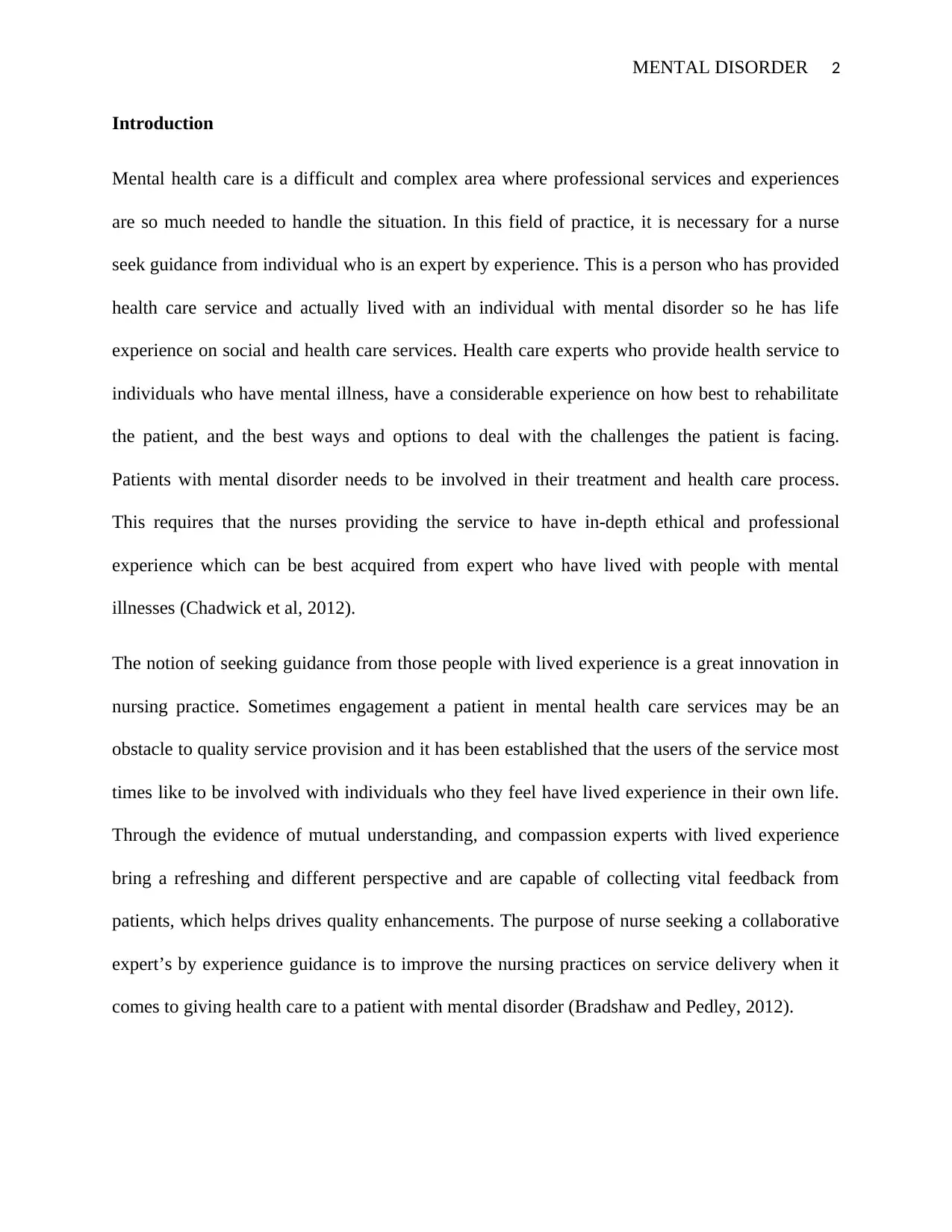
MENTAL DISORDER 2
Introduction
Mental health care is a difficult and complex area where professional services and experiences
are so much needed to handle the situation. In this field of practice, it is necessary for a nurse
seek guidance from individual who is an expert by experience. This is a person who has provided
health care service and actually lived with an individual with mental disorder so he has life
experience on social and health care services. Health care experts who provide health service to
individuals who have mental illness, have a considerable experience on how best to rehabilitate
the patient, and the best ways and options to deal with the challenges the patient is facing.
Patients with mental disorder needs to be involved in their treatment and health care process.
This requires that the nurses providing the service to have in-depth ethical and professional
experience which can be best acquired from expert who have lived with people with mental
illnesses (Chadwick et al, 2012).
The notion of seeking guidance from those people with lived experience is a great innovation in
nursing practice. Sometimes engagement a patient in mental health care services may be an
obstacle to quality service provision and it has been established that the users of the service most
times like to be involved with individuals who they feel have lived experience in their own life.
Through the evidence of mutual understanding, and compassion experts with lived experience
bring a refreshing and different perspective and are capable of collecting vital feedback from
patients, which helps drives quality enhancements. The purpose of nurse seeking a collaborative
expert’s by experience guidance is to improve the nursing practices on service delivery when it
comes to giving health care to a patient with mental disorder (Bradshaw and Pedley, 2012).
Introduction
Mental health care is a difficult and complex area where professional services and experiences
are so much needed to handle the situation. In this field of practice, it is necessary for a nurse
seek guidance from individual who is an expert by experience. This is a person who has provided
health care service and actually lived with an individual with mental disorder so he has life
experience on social and health care services. Health care experts who provide health service to
individuals who have mental illness, have a considerable experience on how best to rehabilitate
the patient, and the best ways and options to deal with the challenges the patient is facing.
Patients with mental disorder needs to be involved in their treatment and health care process.
This requires that the nurses providing the service to have in-depth ethical and professional
experience which can be best acquired from expert who have lived with people with mental
illnesses (Chadwick et al, 2012).
The notion of seeking guidance from those people with lived experience is a great innovation in
nursing practice. Sometimes engagement a patient in mental health care services may be an
obstacle to quality service provision and it has been established that the users of the service most
times like to be involved with individuals who they feel have lived experience in their own life.
Through the evidence of mutual understanding, and compassion experts with lived experience
bring a refreshing and different perspective and are capable of collecting vital feedback from
patients, which helps drives quality enhancements. The purpose of nurse seeking a collaborative
expert’s by experience guidance is to improve the nursing practices on service delivery when it
comes to giving health care to a patient with mental disorder (Bradshaw and Pedley, 2012).
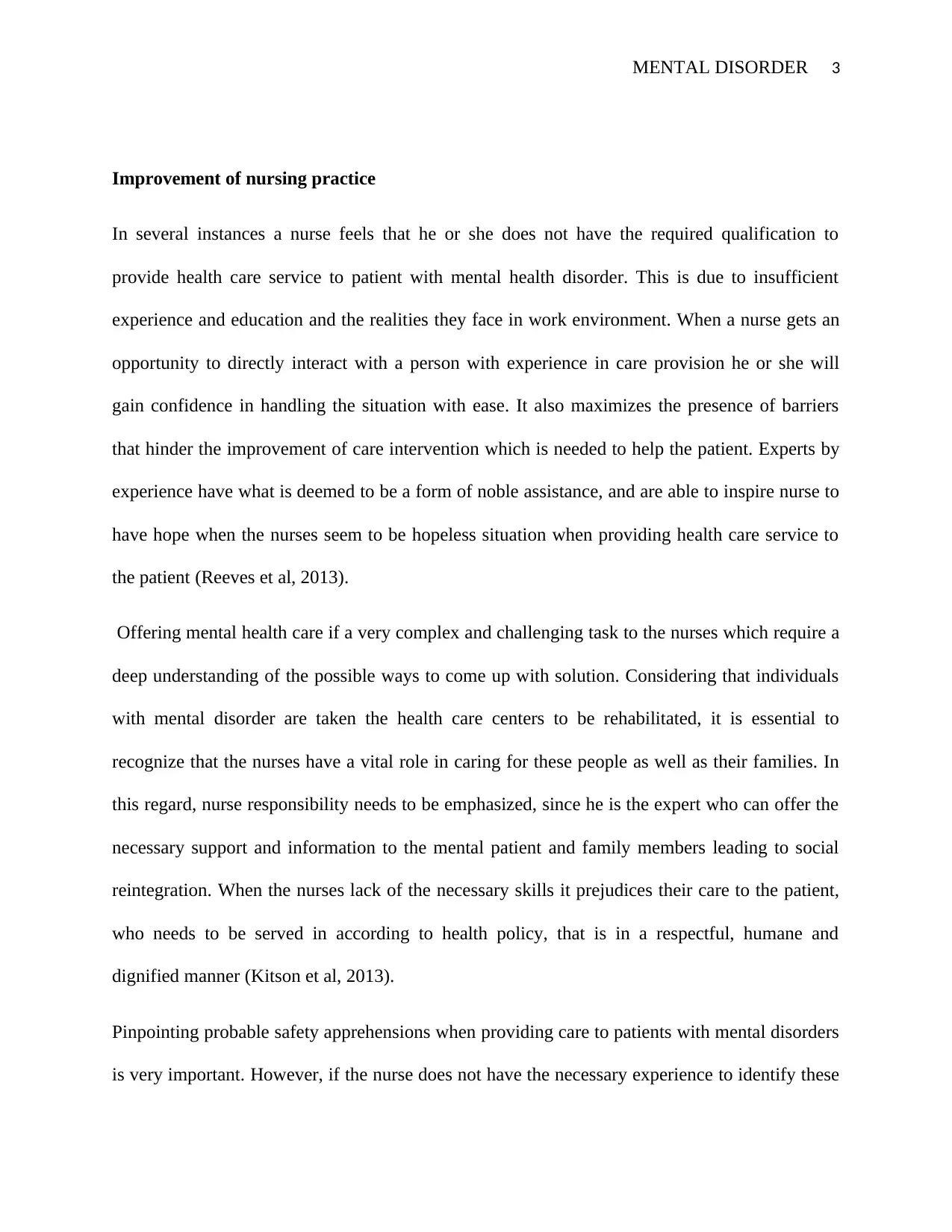
MENTAL DISORDER 3
Improvement of nursing practice
In several instances a nurse feels that he or she does not have the required qualification to
provide health care service to patient with mental health disorder. This is due to insufficient
experience and education and the realities they face in work environment. When a nurse gets an
opportunity to directly interact with a person with experience in care provision he or she will
gain confidence in handling the situation with ease. It also maximizes the presence of barriers
that hinder the improvement of care intervention which is needed to help the patient. Experts by
experience have what is deemed to be a form of noble assistance, and are able to inspire nurse to
have hope when the nurses seem to be hopeless situation when providing health care service to
the patient (Reeves et al, 2013).
Offering mental health care if a very complex and challenging task to the nurses which require a
deep understanding of the possible ways to come up with solution. Considering that individuals
with mental disorder are taken the health care centers to be rehabilitated, it is essential to
recognize that the nurses have a vital role in caring for these people as well as their families. In
this regard, nurse responsibility needs to be emphasized, since he is the expert who can offer the
necessary support and information to the mental patient and family members leading to social
reintegration. When the nurses lack of the necessary skills it prejudices their care to the patient,
who needs to be served in according to health policy, that is in a respectful, humane and
dignified manner (Kitson et al, 2013).
Pinpointing probable safety apprehensions when providing care to patients with mental disorders
is very important. However, if the nurse does not have the necessary experience to identify these
Improvement of nursing practice
In several instances a nurse feels that he or she does not have the required qualification to
provide health care service to patient with mental health disorder. This is due to insufficient
experience and education and the realities they face in work environment. When a nurse gets an
opportunity to directly interact with a person with experience in care provision he or she will
gain confidence in handling the situation with ease. It also maximizes the presence of barriers
that hinder the improvement of care intervention which is needed to help the patient. Experts by
experience have what is deemed to be a form of noble assistance, and are able to inspire nurse to
have hope when the nurses seem to be hopeless situation when providing health care service to
the patient (Reeves et al, 2013).
Offering mental health care if a very complex and challenging task to the nurses which require a
deep understanding of the possible ways to come up with solution. Considering that individuals
with mental disorder are taken the health care centers to be rehabilitated, it is essential to
recognize that the nurses have a vital role in caring for these people as well as their families. In
this regard, nurse responsibility needs to be emphasized, since he is the expert who can offer the
necessary support and information to the mental patient and family members leading to social
reintegration. When the nurses lack of the necessary skills it prejudices their care to the patient,
who needs to be served in according to health policy, that is in a respectful, humane and
dignified manner (Kitson et al, 2013).
Pinpointing probable safety apprehensions when providing care to patients with mental disorders
is very important. However, if the nurse does not have the necessary experience to identify these
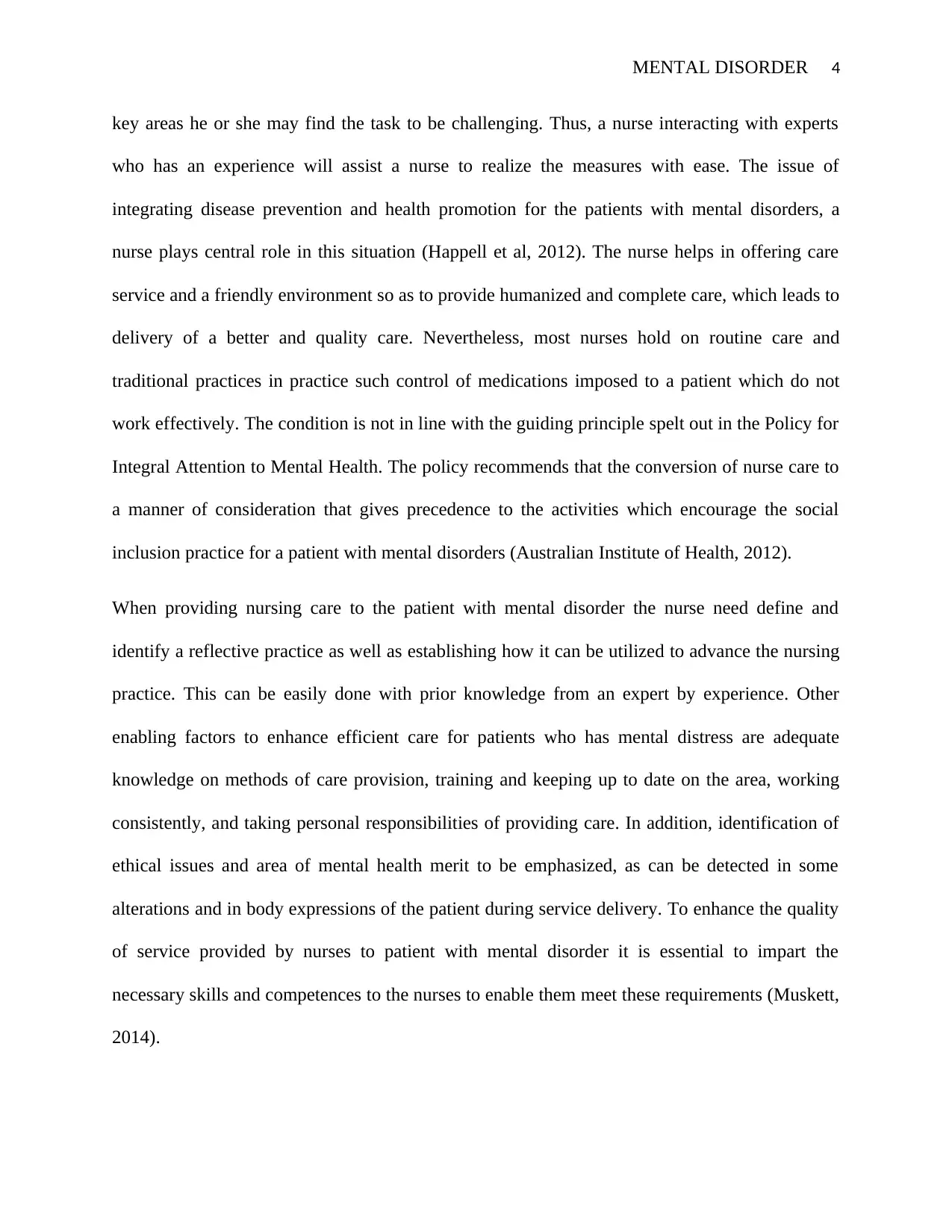
MENTAL DISORDER 4
key areas he or she may find the task to be challenging. Thus, a nurse interacting with experts
who has an experience will assist a nurse to realize the measures with ease. The issue of
integrating disease prevention and health promotion for the patients with mental disorders, a
nurse plays central role in this situation (Happell et al, 2012). The nurse helps in offering care
service and a friendly environment so as to provide humanized and complete care, which leads to
delivery of a better and quality care. Nevertheless, most nurses hold on routine care and
traditional practices in practice such control of medications imposed to a patient which do not
work effectively. The condition is not in line with the guiding principle spelt out in the Policy for
Integral Attention to Mental Health. The policy recommends that the conversion of nurse care to
a manner of consideration that gives precedence to the activities which encourage the social
inclusion practice for a patient with mental disorders (Australian Institute of Health, 2012).
When providing nursing care to the patient with mental disorder the nurse need define and
identify a reflective practice as well as establishing how it can be utilized to advance the nursing
practice. This can be easily done with prior knowledge from an expert by experience. Other
enabling factors to enhance efficient care for patients who has mental distress are adequate
knowledge on methods of care provision, training and keeping up to date on the area, working
consistently, and taking personal responsibilities of providing care. In addition, identification of
ethical issues and area of mental health merit to be emphasized, as can be detected in some
alterations and in body expressions of the patient during service delivery. To enhance the quality
of service provided by nurses to patient with mental disorder it is essential to impart the
necessary skills and competences to the nurses to enable them meet these requirements (Muskett,
2014).
key areas he or she may find the task to be challenging. Thus, a nurse interacting with experts
who has an experience will assist a nurse to realize the measures with ease. The issue of
integrating disease prevention and health promotion for the patients with mental disorders, a
nurse plays central role in this situation (Happell et al, 2012). The nurse helps in offering care
service and a friendly environment so as to provide humanized and complete care, which leads to
delivery of a better and quality care. Nevertheless, most nurses hold on routine care and
traditional practices in practice such control of medications imposed to a patient which do not
work effectively. The condition is not in line with the guiding principle spelt out in the Policy for
Integral Attention to Mental Health. The policy recommends that the conversion of nurse care to
a manner of consideration that gives precedence to the activities which encourage the social
inclusion practice for a patient with mental disorders (Australian Institute of Health, 2012).
When providing nursing care to the patient with mental disorder the nurse need define and
identify a reflective practice as well as establishing how it can be utilized to advance the nursing
practice. This can be easily done with prior knowledge from an expert by experience. Other
enabling factors to enhance efficient care for patients who has mental distress are adequate
knowledge on methods of care provision, training and keeping up to date on the area, working
consistently, and taking personal responsibilities of providing care. In addition, identification of
ethical issues and area of mental health merit to be emphasized, as can be detected in some
alterations and in body expressions of the patient during service delivery. To enhance the quality
of service provided by nurses to patient with mental disorder it is essential to impart the
necessary skills and competences to the nurses to enable them meet these requirements (Muskett,
2014).
Secure Best Marks with AI Grader
Need help grading? Try our AI Grader for instant feedback on your assignments.
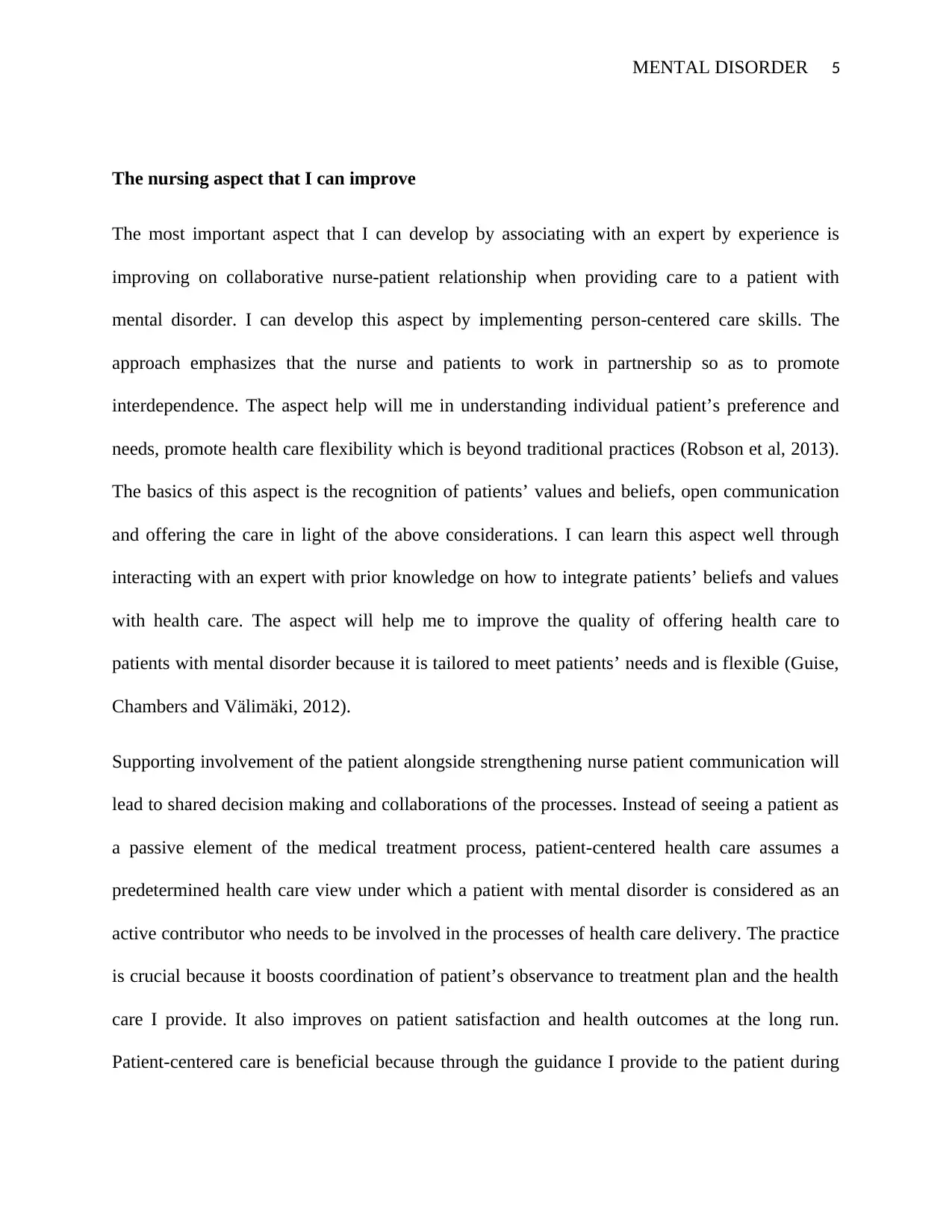
MENTAL DISORDER 5
The nursing aspect that I can improve
The most important aspect that I can develop by associating with an expert by experience is
improving on collaborative nurse-patient relationship when providing care to a patient with
mental disorder. I can develop this aspect by implementing person-centered care skills. The
approach emphasizes that the nurse and patients to work in partnership so as to promote
interdependence. The aspect help will me in understanding individual patient’s preference and
needs, promote health care flexibility which is beyond traditional practices (Robson et al, 2013).
The basics of this aspect is the recognition of patients’ values and beliefs, open communication
and offering the care in light of the above considerations. I can learn this aspect well through
interacting with an expert with prior knowledge on how to integrate patients’ beliefs and values
with health care. The aspect will help me to improve the quality of offering health care to
patients with mental disorder because it is tailored to meet patients’ needs and is flexible (Guise,
Chambers and Välimäki, 2012).
Supporting involvement of the patient alongside strengthening nurse patient communication will
lead to shared decision making and collaborations of the processes. Instead of seeing a patient as
a passive element of the medical treatment process, patient-centered health care assumes a
predetermined health care view under which a patient with mental disorder is considered as an
active contributor who needs to be involved in the processes of health care delivery. The practice
is crucial because it boosts coordination of patient’s observance to treatment plan and the health
care I provide. It also improves on patient satisfaction and health outcomes at the long run.
Patient-centered care is beneficial because through the guidance I provide to the patient during
The nursing aspect that I can improve
The most important aspect that I can develop by associating with an expert by experience is
improving on collaborative nurse-patient relationship when providing care to a patient with
mental disorder. I can develop this aspect by implementing person-centered care skills. The
approach emphasizes that the nurse and patients to work in partnership so as to promote
interdependence. The aspect help will me in understanding individual patient’s preference and
needs, promote health care flexibility which is beyond traditional practices (Robson et al, 2013).
The basics of this aspect is the recognition of patients’ values and beliefs, open communication
and offering the care in light of the above considerations. I can learn this aspect well through
interacting with an expert with prior knowledge on how to integrate patients’ beliefs and values
with health care. The aspect will help me to improve the quality of offering health care to
patients with mental disorder because it is tailored to meet patients’ needs and is flexible (Guise,
Chambers and Välimäki, 2012).
Supporting involvement of the patient alongside strengthening nurse patient communication will
lead to shared decision making and collaborations of the processes. Instead of seeing a patient as
a passive element of the medical treatment process, patient-centered health care assumes a
predetermined health care view under which a patient with mental disorder is considered as an
active contributor who needs to be involved in the processes of health care delivery. The practice
is crucial because it boosts coordination of patient’s observance to treatment plan and the health
care I provide. It also improves on patient satisfaction and health outcomes at the long run.
Patient-centered care is beneficial because through the guidance I provide to the patient during
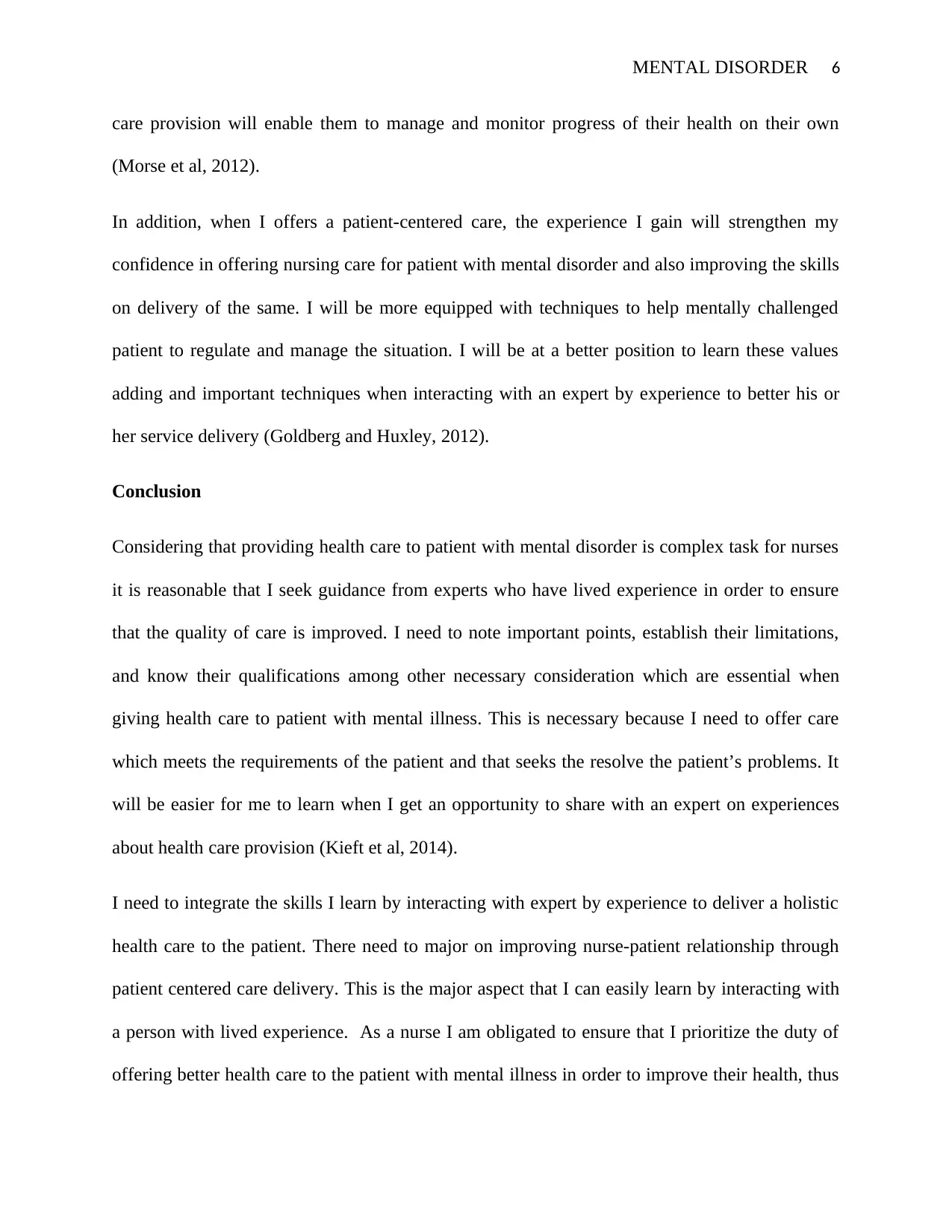
MENTAL DISORDER 6
care provision will enable them to manage and monitor progress of their health on their own
(Morse et al, 2012).
In addition, when I offers a patient-centered care, the experience I gain will strengthen my
confidence in offering nursing care for patient with mental disorder and also improving the skills
on delivery of the same. I will be more equipped with techniques to help mentally challenged
patient to regulate and manage the situation. I will be at a better position to learn these values
adding and important techniques when interacting with an expert by experience to better his or
her service delivery (Goldberg and Huxley, 2012).
Conclusion
Considering that providing health care to patient with mental disorder is complex task for nurses
it is reasonable that I seek guidance from experts who have lived experience in order to ensure
that the quality of care is improved. I need to note important points, establish their limitations,
and know their qualifications among other necessary consideration which are essential when
giving health care to patient with mental illness. This is necessary because I need to offer care
which meets the requirements of the patient and that seeks the resolve the patient’s problems. It
will be easier for me to learn when I get an opportunity to share with an expert on experiences
about health care provision (Kieft et al, 2014).
I need to integrate the skills I learn by interacting with expert by experience to deliver a holistic
health care to the patient. There need to major on improving nurse-patient relationship through
patient centered care delivery. This is the major aspect that I can easily learn by interacting with
a person with lived experience. As a nurse I am obligated to ensure that I prioritize the duty of
offering better health care to the patient with mental illness in order to improve their health, thus
care provision will enable them to manage and monitor progress of their health on their own
(Morse et al, 2012).
In addition, when I offers a patient-centered care, the experience I gain will strengthen my
confidence in offering nursing care for patient with mental disorder and also improving the skills
on delivery of the same. I will be more equipped with techniques to help mentally challenged
patient to regulate and manage the situation. I will be at a better position to learn these values
adding and important techniques when interacting with an expert by experience to better his or
her service delivery (Goldberg and Huxley, 2012).
Conclusion
Considering that providing health care to patient with mental disorder is complex task for nurses
it is reasonable that I seek guidance from experts who have lived experience in order to ensure
that the quality of care is improved. I need to note important points, establish their limitations,
and know their qualifications among other necessary consideration which are essential when
giving health care to patient with mental illness. This is necessary because I need to offer care
which meets the requirements of the patient and that seeks the resolve the patient’s problems. It
will be easier for me to learn when I get an opportunity to share with an expert on experiences
about health care provision (Kieft et al, 2014).
I need to integrate the skills I learn by interacting with expert by experience to deliver a holistic
health care to the patient. There need to major on improving nurse-patient relationship through
patient centered care delivery. This is the major aspect that I can easily learn by interacting with
a person with lived experience. As a nurse I am obligated to ensure that I prioritize the duty of
offering better health care to the patient with mental illness in order to improve their health, thus
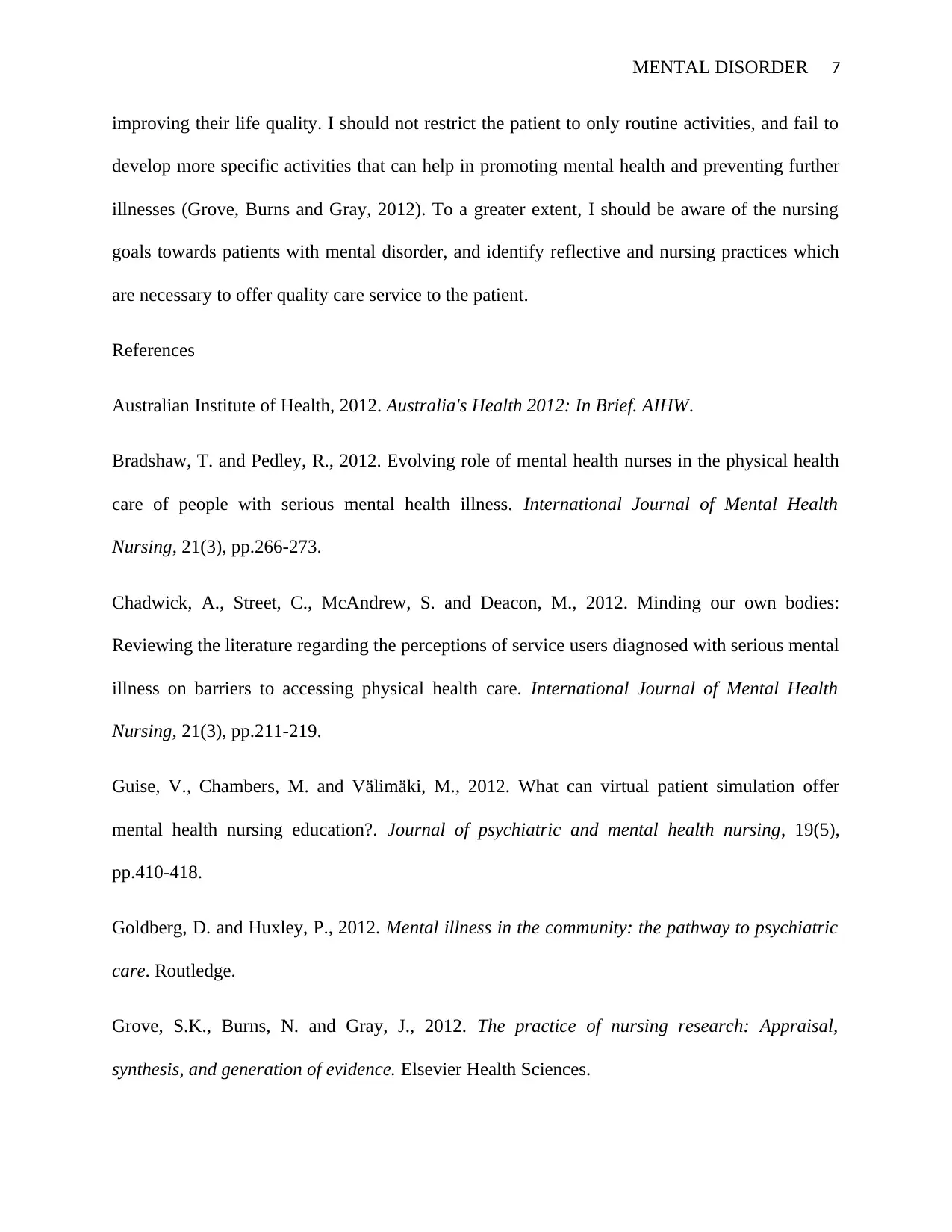
MENTAL DISORDER 7
improving their life quality. I should not restrict the patient to only routine activities, and fail to
develop more specific activities that can help in promoting mental health and preventing further
illnesses (Grove, Burns and Gray, 2012). To a greater extent, I should be aware of the nursing
goals towards patients with mental disorder, and identify reflective and nursing practices which
are necessary to offer quality care service to the patient.
References
Australian Institute of Health, 2012. Australia's Health 2012: In Brief. AIHW.
Bradshaw, T. and Pedley, R., 2012. Evolving role of mental health nurses in the physical health
care of people with serious mental health illness. International Journal of Mental Health
Nursing, 21(3), pp.266-273.
Chadwick, A., Street, C., McAndrew, S. and Deacon, M., 2012. Minding our own bodies:
Reviewing the literature regarding the perceptions of service users diagnosed with serious mental
illness on barriers to accessing physical health care. International Journal of Mental Health
Nursing, 21(3), pp.211-219.
Guise, V., Chambers, M. and Välimäki, M., 2012. What can virtual patient simulation offer
mental health nursing education?. Journal of psychiatric and mental health nursing, 19(5),
pp.410-418.
Goldberg, D. and Huxley, P., 2012. Mental illness in the community: the pathway to psychiatric
care. Routledge.
Grove, S.K., Burns, N. and Gray, J., 2012. The practice of nursing research: Appraisal,
synthesis, and generation of evidence. Elsevier Health Sciences.
improving their life quality. I should not restrict the patient to only routine activities, and fail to
develop more specific activities that can help in promoting mental health and preventing further
illnesses (Grove, Burns and Gray, 2012). To a greater extent, I should be aware of the nursing
goals towards patients with mental disorder, and identify reflective and nursing practices which
are necessary to offer quality care service to the patient.
References
Australian Institute of Health, 2012. Australia's Health 2012: In Brief. AIHW.
Bradshaw, T. and Pedley, R., 2012. Evolving role of mental health nurses in the physical health
care of people with serious mental health illness. International Journal of Mental Health
Nursing, 21(3), pp.266-273.
Chadwick, A., Street, C., McAndrew, S. and Deacon, M., 2012. Minding our own bodies:
Reviewing the literature regarding the perceptions of service users diagnosed with serious mental
illness on barriers to accessing physical health care. International Journal of Mental Health
Nursing, 21(3), pp.211-219.
Guise, V., Chambers, M. and Välimäki, M., 2012. What can virtual patient simulation offer
mental health nursing education?. Journal of psychiatric and mental health nursing, 19(5),
pp.410-418.
Goldberg, D. and Huxley, P., 2012. Mental illness in the community: the pathway to psychiatric
care. Routledge.
Grove, S.K., Burns, N. and Gray, J., 2012. The practice of nursing research: Appraisal,
synthesis, and generation of evidence. Elsevier Health Sciences.
Paraphrase This Document
Need a fresh take? Get an instant paraphrase of this document with our AI Paraphraser
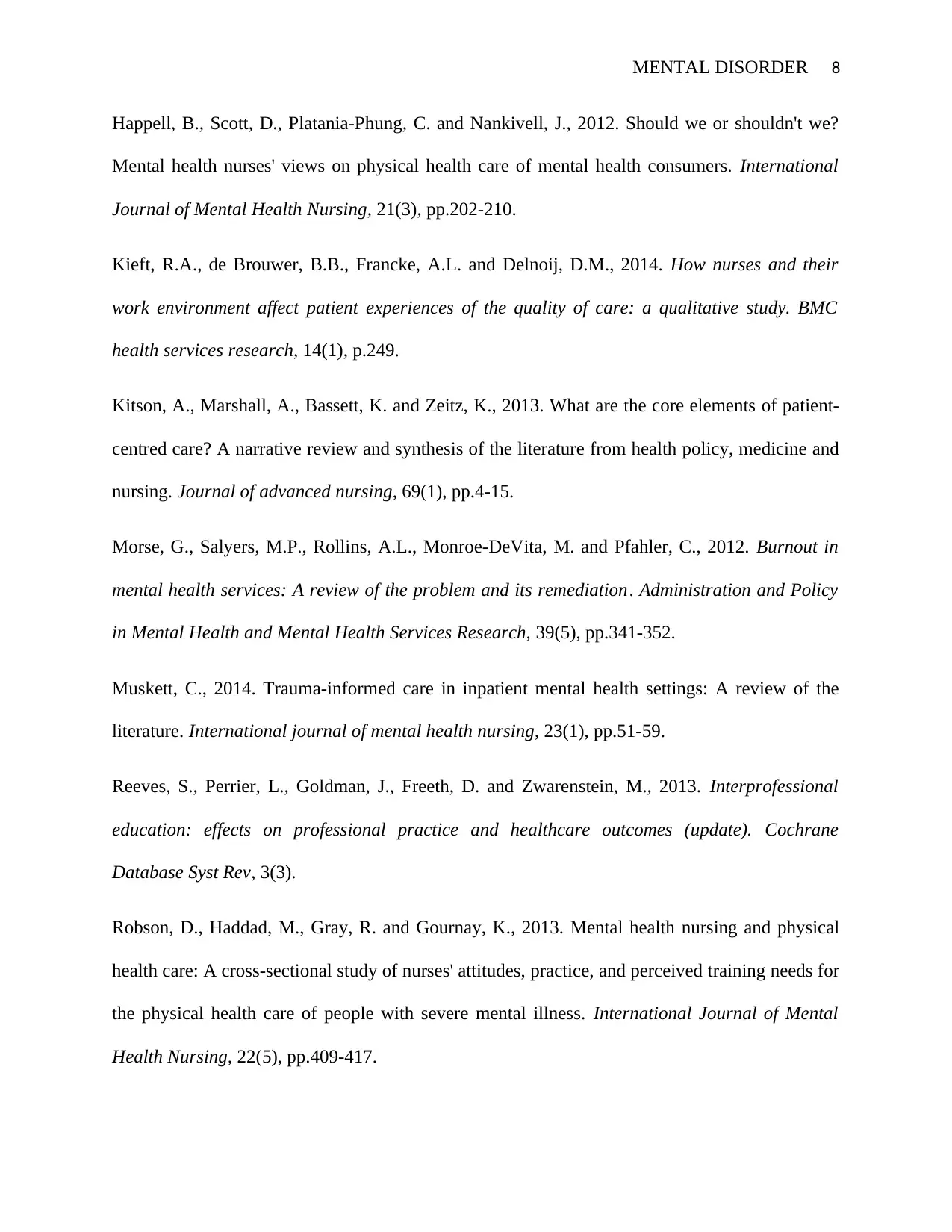
MENTAL DISORDER 8
Happell, B., Scott, D., Platania‐Phung, C. and Nankivell, J., 2012. Should we or shouldn't we?
Mental health nurses' views on physical health care of mental health consumers. International
Journal of Mental Health Nursing, 21(3), pp.202-210.
Kieft, R.A., de Brouwer, B.B., Francke, A.L. and Delnoij, D.M., 2014. How nurses and their
work environment affect patient experiences of the quality of care: a qualitative study. BMC
health services research, 14(1), p.249.
Kitson, A., Marshall, A., Bassett, K. and Zeitz, K., 2013. What are the core elements of patient‐
centred care? A narrative review and synthesis of the literature from health policy, medicine and
nursing. Journal of advanced nursing, 69(1), pp.4-15.
Morse, G., Salyers, M.P., Rollins, A.L., Monroe-DeVita, M. and Pfahler, C., 2012. Burnout in
mental health services: A review of the problem and its remediation. Administration and Policy
in Mental Health and Mental Health Services Research, 39(5), pp.341-352.
Muskett, C., 2014. Trauma‐informed care in inpatient mental health settings: A review of the
literature. International journal of mental health nursing, 23(1), pp.51-59.
Reeves, S., Perrier, L., Goldman, J., Freeth, D. and Zwarenstein, M., 2013. Interprofessional
education: effects on professional practice and healthcare outcomes (update). Cochrane
Database Syst Rev, 3(3).
Robson, D., Haddad, M., Gray, R. and Gournay, K., 2013. Mental health nursing and physical
health care: A cross‐sectional study of nurses' attitudes, practice, and perceived training needs for
the physical health care of people with severe mental illness. International Journal of Mental
Health Nursing, 22(5), pp.409-417.
Happell, B., Scott, D., Platania‐Phung, C. and Nankivell, J., 2012. Should we or shouldn't we?
Mental health nurses' views on physical health care of mental health consumers. International
Journal of Mental Health Nursing, 21(3), pp.202-210.
Kieft, R.A., de Brouwer, B.B., Francke, A.L. and Delnoij, D.M., 2014. How nurses and their
work environment affect patient experiences of the quality of care: a qualitative study. BMC
health services research, 14(1), p.249.
Kitson, A., Marshall, A., Bassett, K. and Zeitz, K., 2013. What are the core elements of patient‐
centred care? A narrative review and synthesis of the literature from health policy, medicine and
nursing. Journal of advanced nursing, 69(1), pp.4-15.
Morse, G., Salyers, M.P., Rollins, A.L., Monroe-DeVita, M. and Pfahler, C., 2012. Burnout in
mental health services: A review of the problem and its remediation. Administration and Policy
in Mental Health and Mental Health Services Research, 39(5), pp.341-352.
Muskett, C., 2014. Trauma‐informed care in inpatient mental health settings: A review of the
literature. International journal of mental health nursing, 23(1), pp.51-59.
Reeves, S., Perrier, L., Goldman, J., Freeth, D. and Zwarenstein, M., 2013. Interprofessional
education: effects on professional practice and healthcare outcomes (update). Cochrane
Database Syst Rev, 3(3).
Robson, D., Haddad, M., Gray, R. and Gournay, K., 2013. Mental health nursing and physical
health care: A cross‐sectional study of nurses' attitudes, practice, and perceived training needs for
the physical health care of people with severe mental illness. International Journal of Mental
Health Nursing, 22(5), pp.409-417.

MENTAL DISORDER 9
1 out of 9
Related Documents
Your All-in-One AI-Powered Toolkit for Academic Success.
+13062052269
info@desklib.com
Available 24*7 on WhatsApp / Email
![[object Object]](/_next/static/media/star-bottom.7253800d.svg)
Unlock your academic potential
© 2024 | Zucol Services PVT LTD | All rights reserved.





